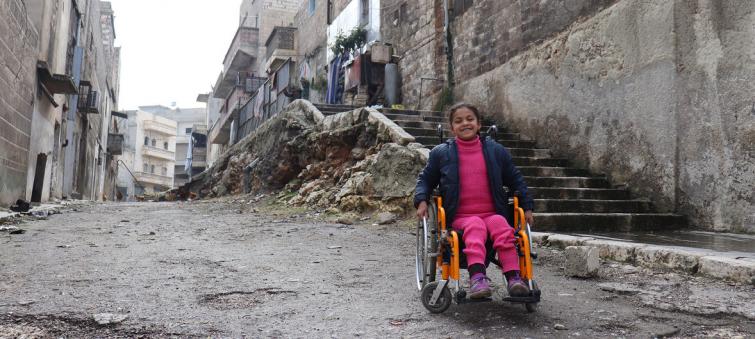
Preventing discrimination against people with disabilities in COVID-19 response
New York/IBNS: Unless Governments and communities take action, discrimination against people with disabilities could increase during the COVID-19 pandemic, an expert with the World Health Organization (WHO) has warned.
Lindsay Lee, a WHO Technical Officer who works on issues related to people with disabilities, was speaking during a Q&A the UN health agency hosted on its Twitter account on Thursday.
“What worries me perhaps more than anything is just the existing barriers that people with disabilities face. I can speak for this myself, personally”, she said.
Lee, who uses a wheelchair, explained that health care access is already difficult for some people with disabilities, even in high-income locations. Other barriers include physical obstacles, discriminatory laws and existing stigma.
“These things, if Governments and communities aren’t careful, can be exacerbated in crisis situations,” she said. “But if the whole community is willing to do its part, these sorts of risks can certainly be mitigated”.
Feeling ‘left behind’
Globally, an estimated one billion people – roughly 15 per cent of the world’s population – live with some form of disability, according to WHO, which is leading the fight to halt further spread of the novel coronavirus disease.
So far, there have been more than 200,000 cases worldwide, and over 8,000 deaths.
Lee explained that people with disabilities experience increased risk of contracting COVID-19. Some may have difficulties in implementing basic hygiene measures to keep the virus at bay. Others may not be able to practice social distancing because they require care or other support.
Additionally, some persons with disabilities who contract the virus could develop a severe case of the disease as it can worsen existing health conditions, particularly related to immune response or respiratory function.
As countries continue to battle the pandemic, people with disabilities deserve to be reassured that their survival is a priority, a UN independent human rights expert has stated.
Catalina Devandas Aguilar, UN Special Rapporteur on the rights of persons with disabilities, warned that little has been done to provide guidance and support to this community.
“People with disabilities feel they have been left behind”, she said in a statement issued on Tuesday.
Supportive measures needed
Devandas underlined that reasonable accommodation measures are essential during the outbreak to enable people with disabilities to reduce contacts and the risk of contamination. The same also should apply to family members and caregivers who support them.
Furthermore, people with disabilities should be allowed to work from home, or be granted paid leave, to guarantee their income security.
“Access to additional financial aid is also vital to reduce the risk of people with disabilities and their families falling into greater vulnerability or poverty,” she added.
 “Many people with disabilities depend on services that have been suspended and may not have enough money to stockpile food and medicine, or afford the extra cost of home deliveries.”
The rights expert also expressed concern over the grave situation of people with disabilities who are in institutions, where contamination risk is high as is “lack of oversight, aggravated by the use of emergency powers for health reasons”.
Devandas suggested that restrictions to protect public health should be narrowly tailored and non-intrusive as limiting contact with loved ones leaves people with disabilities “totally unprotected” from abuse or neglect in these settings.
Make public health messages accessible to all
Both Lee and Devandas stressed that during the current outbreak, authorities must provide public health information that is accessible to people with disabilities, such as using sign language, captioning, text messages and relay services.
Lee reminded her audience that everyone needs to take precautions against COVID-19. Therefore, those at higher risk of the disease might need to be “a bit aggressive”: for example, by demanding that visitors wash their hands when they enter their homes.
With many people avoiding public spaces, she also recommended that people with disabilities devise back-up plans in the event their caregivers might be reluctant to come in to work.
Above all, Governments must ensure societies are accessible to this population, including within health care settings, she said, citing WHO guidance.
Photo caption and credit:
UNICEF/Khudr Al-Issa
Eight-year-old Hanaa, who was paralysed by an exploding bomb and lost the use of her legs, sits in her wheelchair near her home in East Aleppo City, Syria (28 February 2018)
Support Our Journalism
We cannot do without you.. your contribution supports unbiased journalism
IBNS is not driven by any ism- not wokeism, not racism, not skewed secularism, not hyper right-wing or left liberal ideals, nor by any hardline religious beliefs or hyper nationalism. We want to serve you good old objective news, as they are. We do not judge or preach. We let people decide for themselves. We only try to present factual and well-sourced news.







